App auto-renewal tricks are numerous, is AI the ultimate nemesis of rogue software?
![]() 11/28 2024
11/28 2024
![]() 689
689
Another App has been named and criticized!
Recently, the Shanghai Consumer Council conducted an investigation into 70 Apps and 30 micro-short dramas, discovering issues with some Apps regarding their fulfillment of the obligation to inform users about auto-renewal. Issues included not specifying renewal prices, lax "confirm subscription" settings, and failing to notify consumers before auto-renewal.
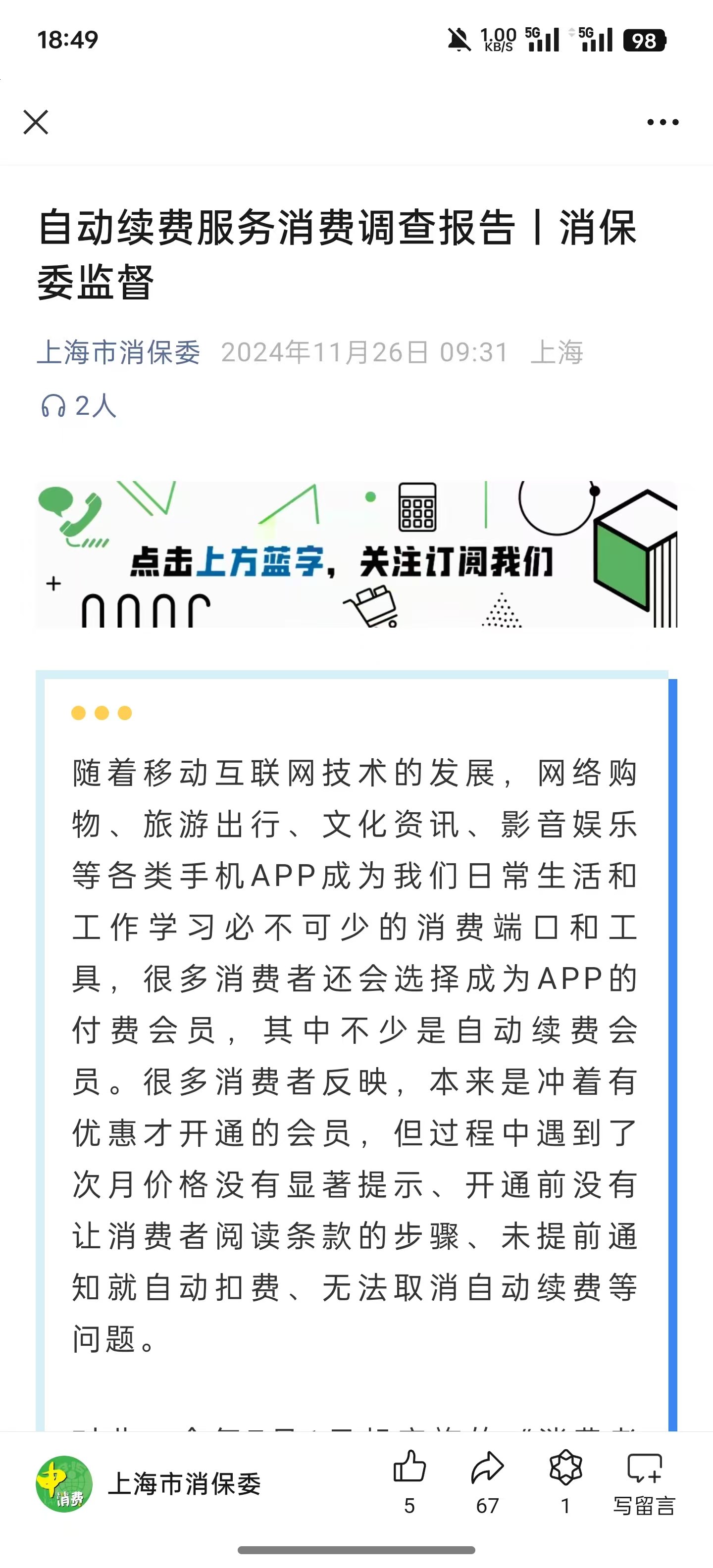
(Image source: Screenshot from the Shanghai Consumer Council's official account)
The topic of App auto-renewal is nothing new. Consumer rights protection committees and consumer associations across China have jointly issued policies with relevant departments to regulate the App auto-renewal process. However, even today, Apps continue to violate regulations frequently, including some national-level apps with hundreds of millions of users.
Numerous auto-renewal tricks due to "profit first"?
Searching for "auto-renewal" on Sina's consumer complaint platform HeiMao, one will find over 180,000 related complaints. Many netizens have expressed being charged continuously for several months without their knowledge, with losses ranging from tens to hundreds of yuan.
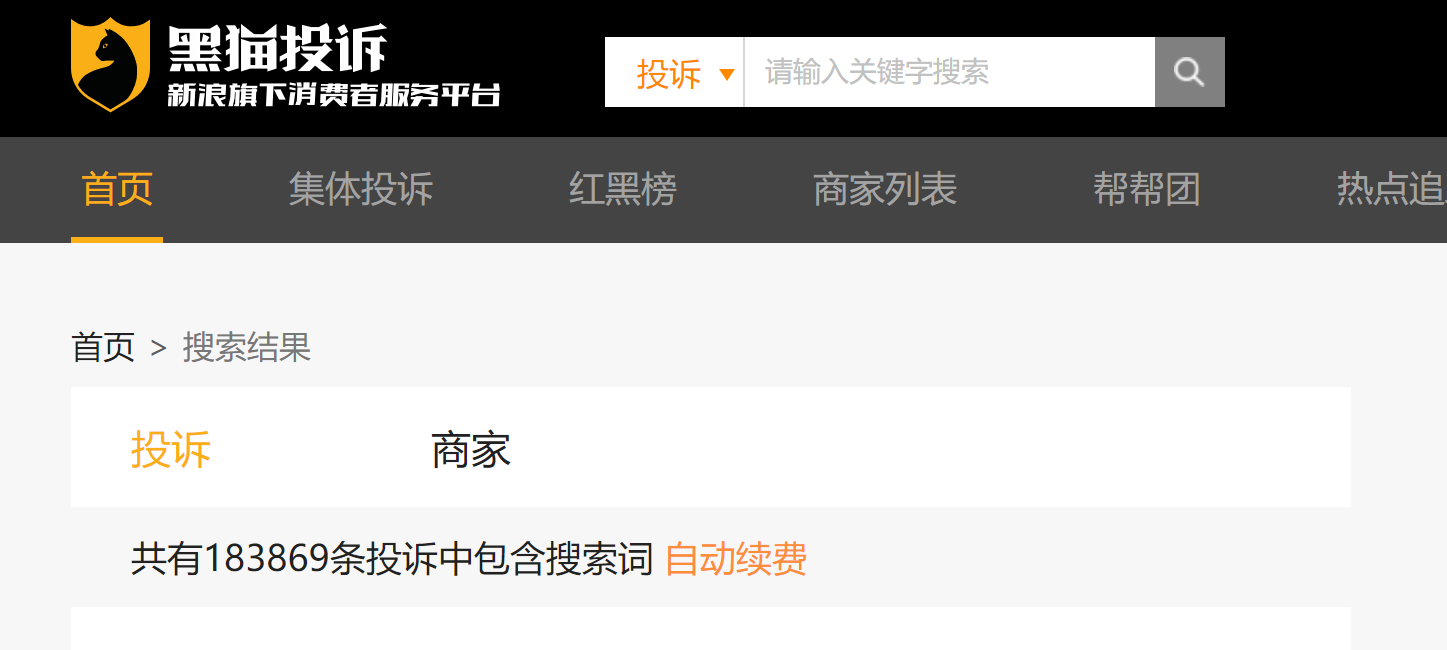
(Image source: Screenshot from HeiMao complaints)
The Shanghai Consumer Council has pointed out two common types of auto-renewal violations: failing to specify or prominently display renewal prices and failing to notify consumers before auto-renewal. Many Apps offer extra discounts for the first few months in their continuous monthly subscription model, with prices rising after the promotional period.
Some Apps do not inform consumers of subsequent renewal amounts, leading them to mistakenly believe the initial discounted price is the ongoing monthly subscription price, failing to stop the renewal in time.
Not notifying consumers of the auto-renewal date is done to prevent them from stopping the subscription. I once subscribed to QQ Music's annual continuous subscription and was unknowingly charged for another year, even though I had switched to NetEase Cloud Music by then. However, after relevant regulations were improved, QQ Music now reminds me multiple times before each auto-renewal. Reminded today, I remembered starting a continuous monthly subscription a month ago to listen to a specific song and promptly canceled it, avoiding being charged again.
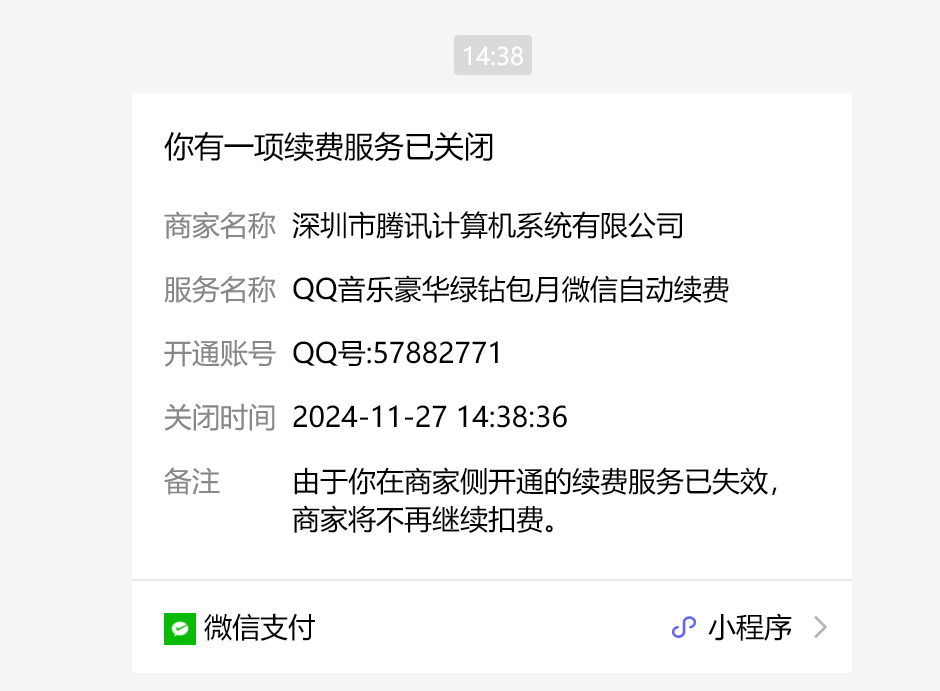
(Image source: WeChat screenshot)
Ultimately, the reason for non-compliance in App auto-renewal subscriptions is profitability. To avoid being canceled, many apps hide the cancel auto-renewal button in fourth or fifth-level submenus.
Taking China's two major payment apps, WeChat and Alipay, as examples, the steps to access the auto-renewal page on WeChat are: Me -> Services -> Wallet -> Payment Settings -> Auto-Renewal. The "Payment Settings" button is in blue text at the bottom, easily overlooked.
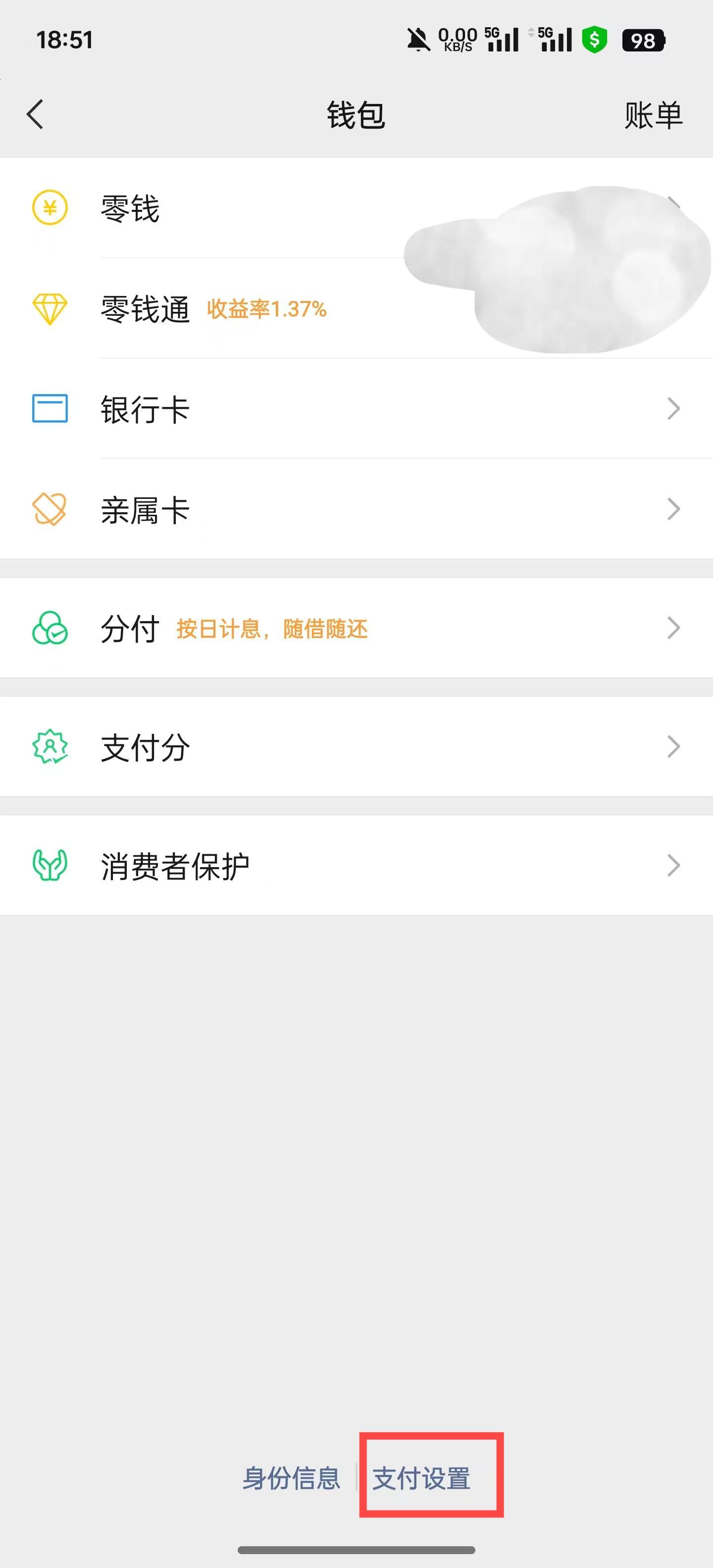
(Image source: WeChat screenshot)
The steps to access the auto-renewal page on Alipay are: My -> Settings -> Payment Settings -> Password-Free Payment/Auto-Renewal, relatively easier to find.
For those who are meticulous, discovering unauthorized auto-renewal charges and then complaining to consumer complaint platforms has a good chance of resolution. For example, on the HeiMao complaint platform, a netizen complained about unauthorized charges by ByteDance's Jianying, and ByteDance successfully refunded the money within three days.
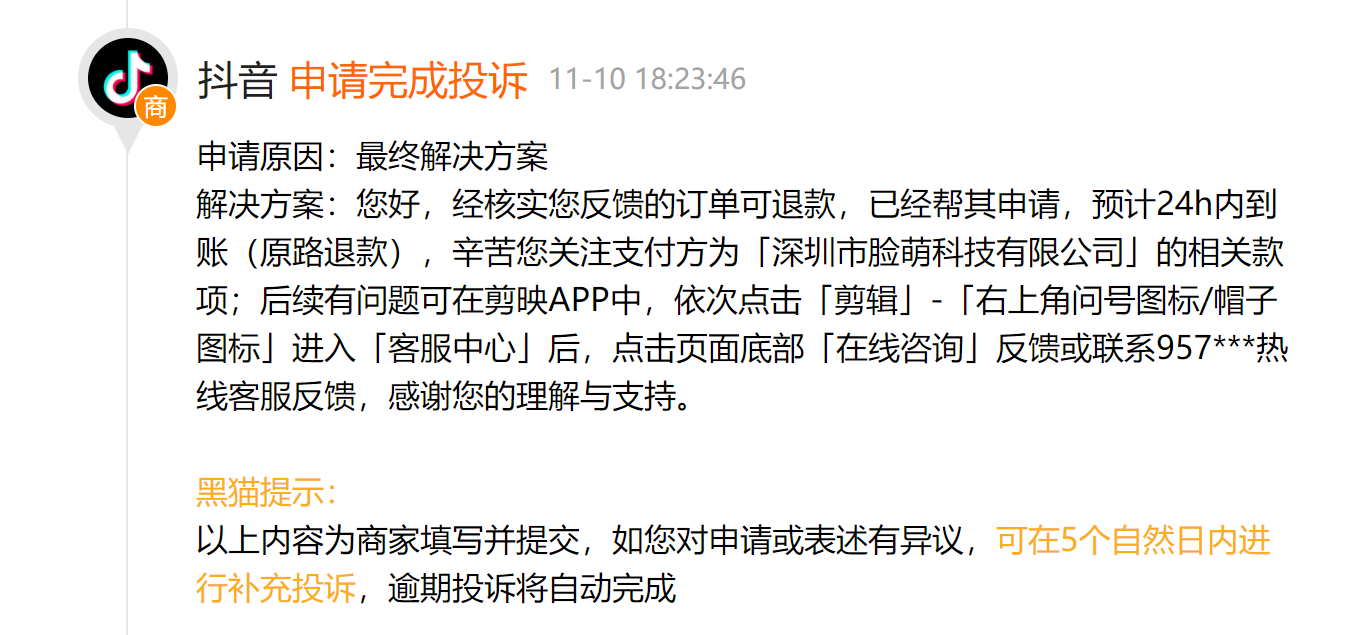
(Image source: Screenshot from HeiMao platform)
For those like me who dislike hassle and are unwilling to be meticulous, it's common not to complain on consumer complaint platforms. Instead, we learn from our mistakes and sometimes form the habit of immediately canceling auto-renewal after enabling it, though we occasionally forget. Some netizens don't even know they can request refunds from app service providers through complaints and end up losing out.
Auto-renewal has long been a significant annoyance for App users, and payment apps hiding auto-renewal in fourth or fifth-level menus makes it harder for users to cancel. To solve the problem of canceling App auto-renewal, AI might be the solution.
Can AI end the tricks of auto-renewal?
In February 2023, the Ministry of Industry and Information Technology issued the "Notice on Further Enhancing Mobile Internet Application Service Capabilities," requiring Apps to notify users through text messages, reminders, and other prominent methods five days before automatic subscription renewal or fees.
The "Shenzhen Special Economic Zone Consumer Rights Protection Regulations," which took effect on January 1 this year, has stricter regulations on issues like big data price discrimination, induced consumption, and absconding after collecting advance payments. Regarding App auto-renewal, the regulations prohibit platforms from defaulting to or binding auto-renewal and require notifying renewal users through effective channels before renewal.
However, faced with potential profits, some companies may still take risks despite strict regulations. Among the 70 Apps inspected by the Shanghai Consumer Council, 34 had insufficiently obvious price difference reminders, and 32 had only one reminder method, potentially overlooked by consumers.
Moreover, only 33 Apps allow canceling auto-renewal directly within the app, while 34 require canceling through payment channels. The complexity of canceling App auto-renewal adds to user frustration. However, the advent of the AI era might bring a solution to this issue.
At the Berlin International Consumer Electronics Show (IFA) in September this year, Honor CEO Zhao Ming first demonstrated the AI Agent integrated into Magic 7, which, unlike previous large language models, is embedded in the system's underlying architecture, capable of actively perceiving the environment, making decisions, and completing tasks.

(Image source: Honor)
At the Magic 7 series launch event on October 30, Zhao Ming used a voice command to order 2,000 cups of coffee through YOYO Assistant integrated with the AI Agent. Besides ordering food delivery and booking tickets, Zhao Ming also showcased Magic 7's ability to cancel auto-payments with a single command.
The AI Agent can more intelligently understand human natural language and operate based on voice commands. After integration with the underlying system, it can perform cross-application operations. Of course, at this stage, the premise of using AI to cancel App auto-renewal is remembering one's subscriptions. It's more crucial for developers to promptly notify consumers of upcoming charges through effective channels.
Currently, AI Agents still have limitations in executing tasks and cannot complete all user-required operations across applications. However, with technological advancements, it's believed that future AI Agents can check all installed Apps for auto-renewal and filter out those with auto-renewal subscriptions, allowing consumers to decide whether to cancel.
AI has unlimited potential. With continuous enhancement, it may eventually gain the ability to fully analyze App functions. By then, AI Agents can not only help users cancel App auto-renewal but also check for other risks associated with Apps. Moreover, phone manufacturers are expediting the development and deployment of end-side large AI models, which can avoid information uploads and protect user privacy.
Undoubtedly, with increasingly stringent regulations and rapid AI development, the space for App developers to exploit consumers is shrinking.
Will AI eradicate all App tricks?
The greatest significance of AI Agents lies in providing users with a simpler and more convenient method to cancel auto-renewal, eliminating the need to search for the cancellation button within payment channels or Apps. China has over 1 billion internet users, many of them elderly with limited smartphone knowledge, making them the most vulnerable to rogue Apps. They often struggle to find ways to cancel auto-renewal.
The crucial factor determining the fate of Apps violating auto-renewal regulations is the laws and regulations formulated by relevant departments and their strict enforcement. Currently, many App developers take chances, making minor violations even if they dare not blatantly break the rules, such as making reminders about subsequent price changes and auto-renewal notifications inconspicuous.

(Image source: AI-generated)
Consumer councils in Shanghai, Shenzhen, and other places strictly enforce relevant regulations and promptly screen Apps in application markets, reducing the survival space for non-compliant developers, whose numbers are rapidly decreasing.
Increasingly sound regulations and rapid AI development have sentenced Apps attempting to conceal auto-renewal through various schemes to death.
Besides auto-renewal, high-frequency advertisements, forced pop-ups, excessive privacy collection, background monitoring, deceptive charging, content Border ball , big data price discrimination, and other detested App issues, as well as various rogue Apps, are expected to be eradicated by AI, which can help users counter tricks.
I also hope that consumer councils and phone manufacturers can promptly review Apps on application stores to prevent rogue Apps from openly entering major phone manufacturers' app stores, harming user interests.
In the past, manually reviewing the millions of Apps on the Android platform was nearly impossible. However, in the AI era, I believe everything is possible, and the day when rogue Apps are completely eradicated from application stores is not far off.
Source: LeiTech






